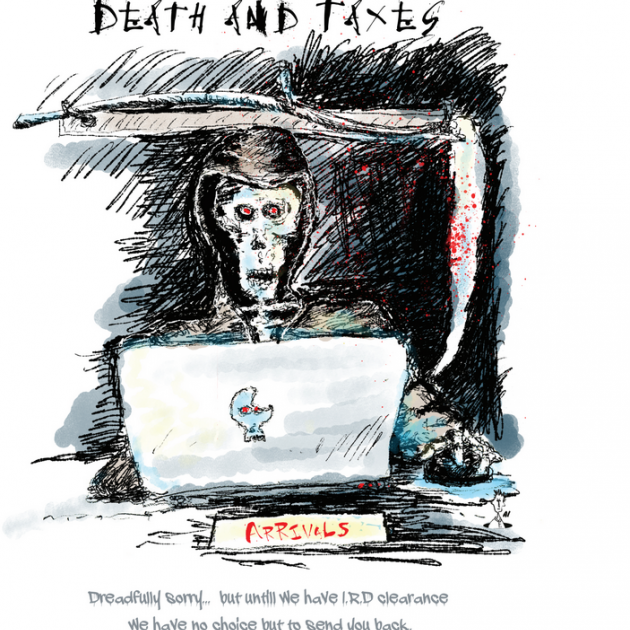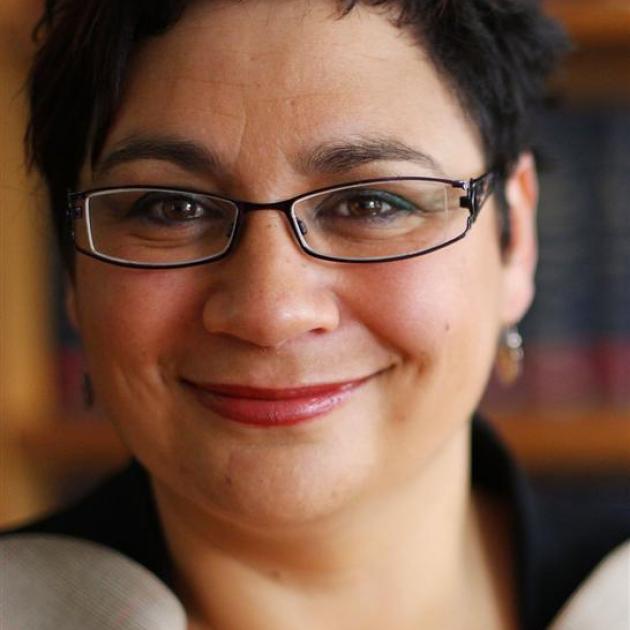
The Panama Papers have pulled the scab off festering anger about growing wealth inequities. Is it time for the return of death taxes? Bruce Munro investigates.
Revelations from the Panama Papers, dishing the dirt on how and where the world's wealthiest people hide their riches, will grab headlines for months to come.
The International Consortium of Investigative Journalists (ICIJ) is still trawling through the 11 million documents leaked from Panamanian law firm Mossack Fonseca. But it has already brought to light international corruption and tax evasion on a staggering scale.
From Russia and the United Kingdom to China and the United States, it appears the global elite have been finding ways to not pay their dues, to the tune of trillions of dollars. Worldwide, the reaction has been vociferous and condemning.
US President Barack Obama summed up the feelings of many with some rare, unscheduled remarks.
"We shouldn't make it legal to engage in transactions just to avoid taxes,'' Mr Obama told reporters.
"A lot of these loopholes come at the expense of middle-class families ... It means that we're not investing as much as we should in schools, in making college more affordable, in putting people back to work rebuilding our roads, our bridges, our infrastructure, creating more opportunities for our children.''
But are Mr Obama's comments true for New Zealand? What are the implications of the Panama Papers for this country?
Peter Bale is a former New Zealand journalist and now head of the Washington-based, non-profit investigative journalist organisation Centre for Public Inquiry, which set up the ICIJ in the late 1990s.
He predicts there is more information to come out of the Panama Papers that will implicate New Zealand as a soft touch for foreigners looking to put money in trusts in this country.
That is one connection that you can expect to see given plenty of attention.
That, however, does not suggest there are lots of rich New Zealanders hiding their wages and salaries to avoid paying tax that should be funding schools and hospitals. In fact, the bean-counters say our top earners are paying a sizeable chunk of the Government's income tax take.
In 2012, left-leaning political scientist Rob Salmond calculated that the top 10% of income earners received 30% of the income and paid 43% of the net tax. His sums included the GST people paid.
A similar picture emerges from Treasury, which says 17% of the population earn more than $70,000 a year and pay 58% of the income tax.
The facts in New Zealand do not line up with Mr Obama's US-based scenario. But, undeniably, the anger the Panama Papers have unleashed around the world - a rising tide of seething resentment towards those with wealth - is felt here.
And the statistics say it may be justified.
While New Zealand's rich may be bearing a larger tax burden, the gap between rich and poor is continuing to widen, both in wealth and income.
During the quarter-century to about 2010, the capital income of the most wealthy quarter of New Zealand households grew by 9.4% while the capital income of the poorest quarter decreased by 3.9%.
This 13.3% gap was the second biggest among OECD countries.
Capital income comes from wealth itself rather than from production or direct work.
In 2012, it was estimated that the top 10% of New Zealand income-earners held more than 50% of the wealth.
Simple income inequality is growing too. After increasing steadily for about 20 years, income inequality began to decrease in 2004. But between 2009 and 2014, it climbed to even higher levels than the 2003 peak.
The most recent data available shows the disposable income of high-income households is 278% larger than the disposable income of low-income households.
The impact of such inequality is no mystery.
THE DEATH TAX
Since the 2009 publication of The Spirit Level, detailing international research on inequality, it has been widely known that health and social problems are worse in more unequal societies, that levels of trust are lower in more unequal countries, and that everyone, including the well-off, is more happy in societies with greater equality.

The anger, therefore, should be no surprise. And without intervention, the expectation is that the inequality, and therefore the outrage, will increase.
French economist Thomas Piketty, in his seminal 2013 book Capital in the Twenty-First Century argues that 250 years of wealth accumulation will only cause greater wealth inequality in the future.
"The past tends to devour the future,'' Mr Piketty wrote. "Wealth originating in the past automatically grows more rapidly ... than wealth stemming from work.''
So, here is the third connection.
Tax is at the heart of the Panama Papers, and, in New Zealand, tax may well hold the solution.
The New Zealand Immigration website, extolling the virtues of Godzone to prospective citizens, proudly lists all the taxes not exacted here.
At the top is one whose very purpose includes decreasing wealth disparities; the death tax.
Death taxes - also known as estate and inheritance taxes - used to be widespread and popular. They are taxes on property that are paid by the estate of someone who has died, or by the person who inherits the property. Their cousin is the gift tax, which is paid on property given while the owner is alive.
All three tend to be progressive taxes, that is, the more valuable the property, the bigger the tax.
They rode on to the world stage in the early 1900s amid much fanfare about ensuring too much wealth did not accumulate in too few hands.
US President Theodore Roosevelt said inheritance and income taxes would tackle the evils of big business as well as wealth and income inequalities. UK Chancellor Lloyd George proclaimed it would "wage implacable warfare against poverty and squalidness''.
New Zealand Prime Minister Joseph Ward said it was "fair'' and "reasonable'' that "those who have the fortune to die wealthy'' should make "a just contribution to the revenue of the country in which their wealth had been obtained''.
In 1915, death taxes brought in more than 13% of the New Zealand Government's total annual tax take. In 1958, the death tax rate rose to 60% of the value of the property. But over time, loopholes and exceptions decreased its effectiveness. And the rise of neo-liberal capitalism made it increasingly unpopular.
In this country, Ruth Richardson, who as Minister of Finance got rid of estate duties in 1992, described them as a "misguided notion that people should not be permitted to accumulate too much wealth''.
Today, death taxes are still used, with varying effectiveness, in a handful of countries such as the US, UK, France, Japan and South Korea.
In February, the Australian charities sector suggested there should be a death tax in that country, saying it would raise about $5.5 billion a year in government revenue.
Should a death tax be reintroduced in New Zealand as a way of rebalancing the distribution of wealth? Gaping holes in the New Zealand tax system need to be fixed, in part to redress inequality, Prof Craig Elliffe says.
"International economists have suggested that because of the growing inequality there might be the need for wealth taxes,'' Prof Elliffe, who is a tax specialist in the University of Auckland law faculty, says.
"French economist Piketty is heading down that line, very clearly.''
But that reform is unlikely to include a death tax. "One of the perceived difficulties is that it is a very old-fashioned, clunky form of tax that can lead to migration of capital and people,'' Prof Elliffe says.
If a death tax were introduced in this country but not elsewhere, it could simply cause older people to shift overseas, taking their wealth with them to keep it out of harm's way.
The political parties are of like mind on this topic. While all, bar Act, agree tax has a role to play in tackling inequality, none favours a death tax.
The change Prof Elliffe favours is a capital gains tax.
"There are two major holes in what would otherwise be our world-class broad base tax system. Capital gains and we don't tax owner-occupied housing,'' he says.
"But hardly anyone taxes owner-occupied housing. So, the only obvious one that we aren't doing is a capital gains tax. Almost everyone in the OECD has a capital gains tax. We are completely anomalous.''
Prof Elliffe is adamant it should be a comprehensive capital gains tax, rather than the piecemeal approach the Government has had to date.
He gives the example of the recent move to tax gains on residential properties sold within two years, excluding the owner's main home.
"It's poorly targeted and easily avoided. It's like we've got the worst of all worlds: bad design features with very little revenue-gathering. It's a mess, quite frankly.''
For the past 60 years, reports and recommendations on introducing a capital gains tax in New Zealand have repeatedly been written, discussed and binned.
Politicians have long had the feeling that introducing such a tax is not the path to power. Perhaps the rising anger, fuelled by the Panama Papers, will tip that balance.
Prof Elliffe certainly believes a capital gains tax is sorely needed.
"I think we all recognise that in addition to collecting the maximum amount of money for the Government - for the least amount of distortion for society and its productive elements - that behaviour is massively driven by the tax system.
"Anyone with younger family in Auckland or Queenstown are only too aware that the tax system is actually failing large elements of our society ...
"It's all very well for property owners, but if you are trying to get ahead it is virtually impossible in some instances.
"If we are serious about having a tax system that is broad base and low rate - and that's what everyone talks about in terms of good tax policy - then we need to address some of these more obvious holes.''
The politicos on tax and inequality ...

Bill English, Minister of Finance, National
We have had a focus on welfare reform, because the best thing we can do for children in hardship is to get their parents into sustainable, full-time work, where that is possible ... A significant amount of income redistribution goes on already. Those earning over $80,000, for example, make up 11% of the adult population but pay 50% of income tax.
Grant Robertson, finance spokesperson, Labour
Income inequality is fairly well understood, but wealth inequality has had significantly less attention ... At the moment our tax system is unbalanced in terms of how labour and wealth/capital are treated. We can address this through looking at altering tax rates, ... cracking down on tax avoidance and evasion and reconsidering how we tax wealth and capital.

Metiria Turei, co-leader, Green Party
There's no doubt that some of our highest earners could afford to chip in a little more, and that little bit more could make a really big difference ... A capital gains tax would remove the perverse incentives property speculators currently have, and encourage people to invest in business and innovation.

Winston Peters, New Zealand First
NZ First will exempt food from liability for GST as a way of helping families on low-to-medium incomes ... An important aspect of [a fair and equitable tax] system is taking tax evasion ... seriously ... NZ First policy is to ensure that there is a crackdown on the international corporates that have been paying derisory tax on income generated in New Zealand.
Marama Fox and Te Ururoa Flavell (pictured), co-leaders, Maori Party
Taxing is part of the solution but so is redistributing that tax take fairly ... Redistribution and closing the tax loopholes are key ... We need a culture of being generous, because you can't address wealth and income inequalities without having a spirit of generosity.

David Seymour, leader, Act Party
Taxation is the solution to funding a decent education for all, and providing the infrastructure for a growing economy. Taxing people just to drag them down is just tall poppy syndrome in the tax code ... The most important thing to address is our dysfunctional housing market ... We must build more homes.

Peter Dunne, leader, United Future
What's harmful about inequality is the effect it can have in terms of poverty, social exclusion and family hardship ... For that reason, we support the income-sharing tax credit that would allow parents of dependent children more flexibility ... in balancing their work and family priorities and give the best start in life for New Zealand children.












